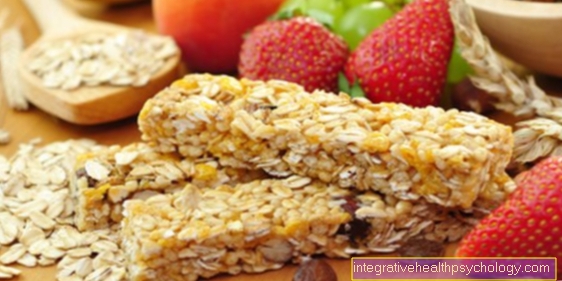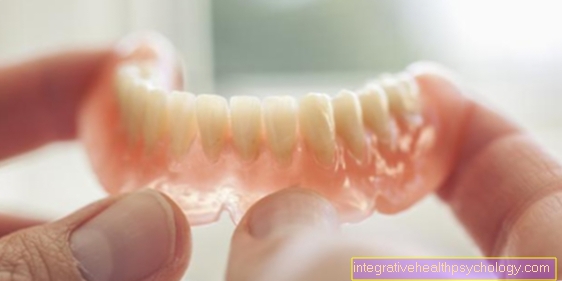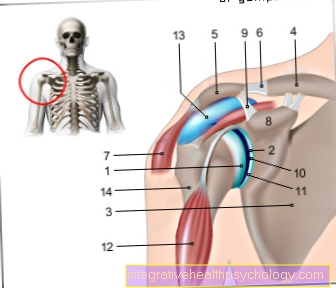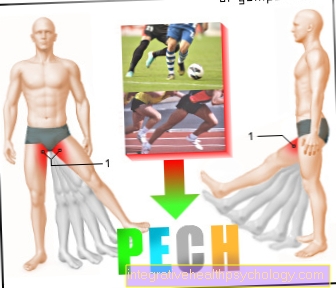Fitness bars
What is a fitness bar?
There is no generally accepted or recognized definition of a fitness bar.
In principle, fitness bars are to be regarded as so-called supplements, i.e. food supplements that are not a substitute for a full meal. However, what all bars have in common is a relatively high mineral and vitamin content, as well as a favorable macronutrient distribution depending on the needs.
You can find a lot of different bars for different needs on the market.

Who are fitness bars suitable for?
In principle, everyone can benefit from a fitness bar. However, it is often athletes who resort to the consumption of fitness bars.
The fitness bar can generally be seen as a simple snack between meals or consciously used as a nutritional supplement for training in strength or endurance sports.
Especially for people who pay attention to their nutrient intake (carbohydrates, fats and proteins), a fitness bar is usually better off than a "muesli bar" from the supermarket. These are usually very sugary and therefore only provide short-term energy, while good fitness bars contain a mixture of short-term sugar and long-chain carbohydrates, which are only made available to the body as energy in two to three hours.
Of course, the individual bars offer different advantages due to their composition, so that certain groups of people benefit more from the consumption of a fitness bar. The bar is harmful, with the exception of food intolerances, but not for anyone.
Also read our article: Nutritional supplements
Which fitness bars are there?
The market currently offers an almost immeasurable selection of different fitness bars for different needs, the most popular fitness bars include:
- Low-carb bars
- Low-carb-high protein bars
- High-protein fitness group
- Energy fitness bar
Low-carb fitness bars: Compared to their total mass, these have a relatively small content of carbohydrates and are therefore mostly aimed at people who prefer a low-carbohydrate diet or a low-carb diet. Usually the sugar or other carbohydrates are replaced by sugar alcohols or the like in order to keep the net carbohydrate content as low as possible.
Low-carb-high-protein fitness bar: In addition to the relatively low carbohydrate content, this fitness bar has a protein content of approx. 30-50%. It is this bar that most people envision as a typical fitness bar. It is suitable for people who want to eat low in carbohydrates but high in protein.
High-protein fitness bar: This fitness bar has both a relatively high protein content and a relatively high carbohydrate content. This fitness bar is therefore able to supply proteins as muscle building materials as well as carbohydrates to replenish glycogen stores.It is suitable as a snack after muscle training if there is no particular form of nutrition such as “Low-carb” as a limiting factor speaks against it.
Energy fitness bar: This variant is characterized by carbohydrates as the main ingredient. Both quickly usable carbohydrates, such as grape sugar, and long-chain carbohydrates, which the body can use after a few hours of energy, are incorporated. Usually there is still a source of "healthy" fats, such as nuts and lots of micronutrients such as vitamins, calcium, magnesium, etc.
This bar is aimed at athletes who are exposed to prolonged, continuous sporting loads, such as marathon runners or triathletes. It can be taken as a meal during exercise and should provide enough energy quickly and long-term.
There are fitness bars that get their protein content from animal sources such as milk protein, as well as vegan fitness bars whose protein content comes from hemp or soy, so that the fitness industry is able to cover all conceivable forms of nutrition.
You might also be interested in these topics:
- Protein bar
- Protein bars
What should you look out for in a fitness bar?
Buying the right fitness bar depends on the requirements for which the bar is to be used.
The bars sometimes contain different ingredients that are geared towards the sporting requirements for which they are recommended.
This should definitely be taken into account when buying the bars.
In addition, the industry already offers different bars for different forms of nutrition. There are also manufacturers who sell vegan fitness bars, but also most of them who use animal protein sources.
Finally, it should be pointed out once again that a fitness bar cannot be a substitute for a balanced diet, but should only be seen as a practical "snack".
The amount of protein supplied is also significantly less favorable compared to a protein shake in terms of the price-performance ratio.
Are "low carb" bars useful?
Low-carb fitness bars can be a useful dietary supplement if taken at the right time.
A short digression to understand the low-carb designation: The statement “low carb”, ie few carbohydrates, refers to the so-called net carbohydrate content of a product. In addition to sugars and long-chain carbohydrates from grain products, there are also polyhydric alcohols, which are also often referred to as sugar alcohols. Although they have a sweetening effect, they are not metabolized by the body like normal carbohydrates and can therefore be subtracted from the total carbohydrate content. This is common practice, but some researchers claim that some or most of the sugar alcohols are metabolized like carbohydrates.
However, since the body's own messenger substance insulin is required to absorb the nutrients into the cells, a carbohydrate-rich meal should be followed two to three hours after consuming a low-carb bar in order to be able to utilize the bar's ingredients to the greatest possible extent.
Read more about this: Low carb diet
What to think of sugar-free fitness bars?
Sugar-free fitness bars are almost always industrially provided with sweeteners such as aspartame or saccharin, which, although they produce a sweet taste, are not used by the body as an energy source, but are excreted again unused. Since these sweeteners, as they are also found in many other light products, are suspected of increasing the risk of diabetes, the consumption of fitness bars should not be exaggerated.
In principle, a low-carb diet is feasible with such sugar-free bars, if this is the declared goal of the consumer.
Can you make fitness bars yourself?
Fitness bars can easily be made in your own kitchen. Different ingredients have to be used depending on your own requirements and needs. Compared to industrially manufactured bars, however, it is difficult to produce a low-carb bar, i.e. a bar with few carbohydrates. Here the industry has other options and substitute products than are available in the domestic kitchen.
However, this also gives the opportunity to rely on particularly "valuable" products for carbohydrates, such as oat, spelled or millet flakes. The protein content of the bars is mainly achieved by classic protein powder, which then also determines the taste of the bars. An alternative here is to use soy products, which can be easily processed when dried and have an extremely high protein content.
Another disadvantage of the homemade bars is their durability. While the self-made bars can be enjoyed for a maximum of two weeks, the industrially manufactured bars can be kept for several months.
Good recipes for in-house production of fitness bars can be found on the Internet or in cookbooks on the subject of fitness and healthy eating.
You might also be interested in this topic: What should be considered when buying protein powder?
What is the goal of dieting with a fitness bar?
Again, it is difficult to find a single goal in a fitness bar diet. The goals are likely as diverse as the bars themselves.
Fitness bars with a high protein content are mainly aimed at strength athletes who want to use the bars to meet their protein needs. Compared to a shake, the bar is more space-saving and safer to transport without the risk of anything leaking.
High-carbohydrate fitness bars, both fast-digesting and long-chain ones, are designed to provide energy to athletes who are exposed to long-term exercise. By providing energy from carbohydrates, they also protect the body from breaking down the muscles to gain energy.
Low-carb fitness bars, on the other hand, are mainly aimed at people who follow a low-carbohydrate diet and are therefore suitable as a "healthy" snack without a guilty conscience. People who eat such bars usually have weight loss as their stated goal.
Also read our articles:
- Protein shake
- Lose weight with protein powder
Rating of of fitness bars
As with all dietary supplements, does not give any real recommendation for the consumption or use of fitness bars. In general, fitness bars, provided they are consumed in moderation, are not to be considered harmful.
As already mentioned, fitness bars are a dietary supplement that is not a substitute for a full, balanced diet. Since there is a huge variety on the market in terms of price, taste or ingredients, a suitable model should be found for almost everyone who is interested.
However, if the bars are to be used to increase protein intake, protein shakes offer a cheaper alternative with even fewer "unnecessary" additives.
Due to their long shelf life, good transportability and the mostly high quality carbohydrates, they are a relatively healthy alternative to the muesli bars from the supermarket.
You may also be interested in this topic: Healthy eating tips





























